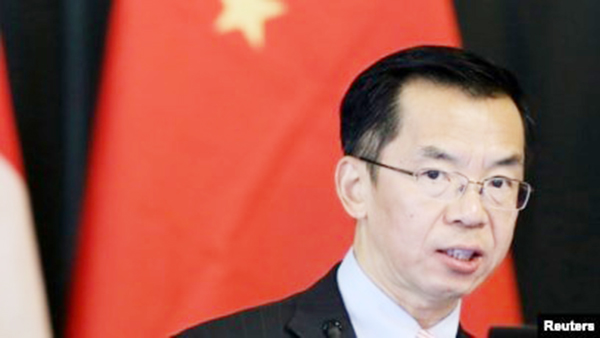LUXEMBOURG/BEIJING/PARIS, (Reuters) – China respects the status of former Soviet member states as sovereign nations, its foreign ministry said yesterday, distancing itself from comments by its envoy to Paris that triggered an uproar among European capitals.
Several European Union foreign ministers had said comments by ambassador Lu Shaye – in which he questioned the sovereignty of Ukraine and other former Soviet states – were unacceptable and had asked Beijing to clarify its stance.
Asked if Lu’s comments represented China’s official position, foreign ministry spokesperson Mao Ning said that Beijing respected the status of the former Soviet member states as sovereign nations following the collapse of the Soviet Union.
Mao told a regular news briefing that it was her remarks on sovereignty that represented China’s official government stance.
The Chinese embassy in Paris issued a statement later on Monday to say that Lu’s comments on Ukraine “were not a political declaration but an expression of his personal views”.
Both statements, following the backlash, appeared to be an effort to ease the tension with the EU while Washington also cited growing closeness between Beijing and Moscow.
“Beijing has distanced itself from the unacceptable remarks by its ambassador,” Josep Borrell told a news conference, saying it was “good news”.
The French foreign ministry said it was “taking note” of Beijing’s “clarifications” and that the minister’s chief of staff had met with Lu on Monday, told him his comments were unacceptable and urged him to speak in a way “that is in line with his country’s official stance.”
Lu has earned himself a reputation as one of China’s “wolf warrior” diplomats, so-called for their hawkish and abrasive style.
Asked about his position on whether Crimea was part of Ukraine or not, Lu had said in an interview aired on French TV on Friday that historically it was part of Russia and had been offered to Ukraine by former Soviet leader Nikita Khrushchev.
“These ex-USSR countries don’t have actual status in international law because there is no international agreement to materialize their sovereign status,” Lu added.
Monday’s statements from the Chinese foreign ministry and embassy in Paris came after criticism from across the EU.
Speaking ahead of a Luxembourg meeting of EU foreign ministers earlier in the day, Czech Foreign Minister Jan Lipavsky said Lu’s comments were “totally unacceptable”.
“I hope the bosses of this ambassador will make these things straight,” he told reporters.
A spokesperson for Germany’s foreign ministry said it had taken note of Lu’s comments “with great astonishment, especially as the statements are not in line with the Chinese position we have known so far.”
Lithuanian Foreign Minister Gabrielius Landsbergis said the three Baltic countries would summon Chinese representatives to officially ask for clarification.
He said Beijing was “sending the same message” as Moscow on questioning the sovereignty of former Soviet countries, which he described as “dangerous”.
Lithuania and its Baltic neighbours Latvia and Estonia were incorporated into the Soviet Union in 1940, but regained independence after its break-up in 1991.
EU leaders would discuss the bloc’s stance towards China and its future relations with Beijing during their next summit in June, EU Council President Charles Michel said.
Lu has been summoned to France’s foreign ministry several times in the past, including for suggesting France was abandoning old people in nursing homes during the COVID-19 pandemic and for calling a respected China scholar at a French think-tank a “mad hyena”.
Asked about Chinese officials’ comments, White House spokesperson John Kirby told MSNBC broadcaster that China and Russia are clearly aligning, adding: “These are two countries that want to challenge outright the international rules-based order … that respects sovereignty around the world.”
“They want to undermine it. They want to reduce and diminish not only the United States and our influence around the world but also our allies and partners.”





